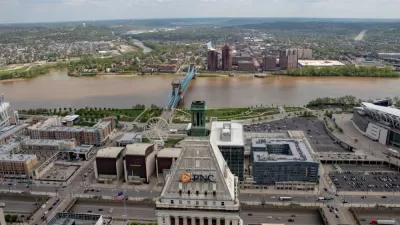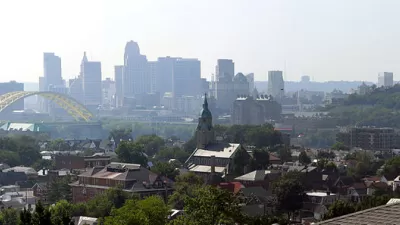It used to be that only New Orleans and Las Vegas allowed people to carry a drink outdoors and imbibe in public. Now cities all over the country, mostly in traditionally conservative states, are loosening their laws.
"Beginning in the 1950s, many cities banned open containers of alcohol in public. Now Canton [Ohio] and several other cities are bringing it back — in a controlled fashion — to appeal to millennials and attract tourists and conventions," according to an article by Tim Henderson.
"In addition to Canton, other Ohio cities including Lancaster, Lorain, Middletown and Toledo launched public drinking areas this year, as did Mississippi cities such as Biloxi and Gulfport," adds Henderson. The changes in local laws followed changes to state laws in both states. But those aren’t the only example of public drinking districts created in the recent years. Nashville, Tennessee; Lincoln, Nebraska; and Mobile, Alabama have all created similar public drinking districts.
Henderson focuses on the example of Canton, which is faced with a shrinking population, currently at 60 percent of its past peak. There, as in in other cities, public drinking is considered a nightlife attraction for Millennials. The article also relies on the testimony of Jim Peters, founder of the Responsible Hospitality Institute.
Hat tip to Barbara Eldredge for sharing the article.
FULL STORY: To Enliven Downtowns, Some Cities Promote Public Drinking

Trump Administration Could Effectively End Housing Voucher Program
Federal officials are eyeing major cuts to the Section 8 program that helps millions of low-income households pay rent.

Planetizen Federal Action Tracker
A weekly monitor of how Trump’s orders and actions are impacting planners and planning in America.

Ken Jennings Launches Transit Web Series
The Jeopardy champ wants you to ride public transit.

Driving Equity and Clean Air: California Invests in Greener School Transportation
California has awarded $500 million to fund 1,000 zero-emission school buses and chargers for educational agencies as part of its effort to reduce pollution, improve student health, and accelerate the transition to clean transportation.

Congress Moves to End Reconnecting Communities and Related Grants
The House Transportation and Infrastructure Committee moved to rescind funding for the Neighborhood Equity and Access program, which funds highway removals, freeway caps, transit projects, pedestrian infrastructure, and more.

From Throughway to Public Space: Taking Back the American Street
How the Covid-19 pandemic taught us new ways to reclaim city streets from cars.
Urban Design for Planners 1: Software Tools
This six-course series explores essential urban design concepts using open source software and equips planners with the tools they need to participate fully in the urban design process.
Planning for Universal Design
Learn the tools for implementing Universal Design in planning regulations.
Heyer Gruel & Associates PA
Ada County Highway District
Institute for Housing and Urban Development Studies (IHS)
City of Grandview
Harvard GSD Executive Education
Toledo-Lucas County Plan Commissions
Salt Lake City
NYU Wagner Graduate School of Public Service





























